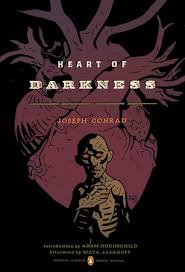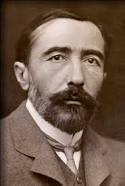Heart of Darkness Page #21
Heart of Darkness is a novella by Polish-British novelist Joseph Conrad, about a voyage up the Congo River into the Congo Free State, in the heart of Africa, by the story's narrator Charles Marlow.
“His aspect reminded me of something I had seen--something funny I had seen somewhere. As I manoeuvred to get alongside, I was asking myself, 'What does this fellow look like?' Suddenly I got it. He looked like a harlequin. His clothes had been made of some stuff that was brown holland probably, but it was covered with patches all over, with bright patches, blue, red, and yellow--patches on the back, patches on the front, patches on elbows, on knees; coloured binding around his jacket, scarlet edging at the bottom of his trousers; and the sunshine made him look extremely gay and wonderfully neat withal, because you could see how beautifully all this patching had been done. A beardless, boyish face, very fair, no features to speak of, nose peeling, little blue eyes, smiles and frowns chasing each other over that open countenance like sunshine and shadow on a wind-swept plain. 'Look out, captain!' he cried; 'there's a snag lodged in here last night.' What! Another snag? I confess I swore shamefully. I had nearly holed my cripple, to finish off that charming trip. The harlequin on the bank turned his little pug-nose up to me. 'You English?' he asked, all smiles. 'Are you?' I shouted from the wheel. The smiles vanished, and he shook his head as if sorry for my disappointment. Then he brightened up. 'Never mind!' he cried encouragingly. 'Are we in time?' I asked. 'He is up there,' he replied, with a toss of the head up the hill, and becoming gloomy all of a sudden. His face was like the autumn sky, overcast one moment and bright the next. “When the manager, escorted by the pilgrims, all of them armed to the teeth, had gone to the house this chap came on board. 'I say, I don't like this. These natives are in the bush,' I said. He assured me earnestly it was all right. 'They are simple people,' he added; 'well, I am glad you came. It took me all my time to keep them off.' 'But you said it was all right,' I cried. 'Oh, they meant no harm,' he said; and as I stared he corrected himself, 'Not exactly.' Then vivaciously, 'My faith, your pilot-house wants a clean-up!' In the next breath he advised me to keep enough steam on the boiler to blow the whistle in case of any trouble. 'One good screech will do more for you than all your rifles. They are simple people,' he repeated. He rattled away at such a rate he quite overwhelmed me. He seemed to be trying to make up for lots of silence, and actually hinted, laughing, that such was the case. 'Don't you talk with Mr. Kurtz?' I said. 'You don't talk with that man--you listen to him,' he exclaimed with severe exaltation. 'But now--' He waved his arm, and in the twinkling of an eye was in the uttermost depths of despondency. In a moment he came up again with a jump, possessed himself of both my hands, shook them continuously, while he gabbled: 'Brother sailor... honour... pleasure... delight... introduce myself... Russian... son of an arch-priest... Government of Tambov... What? Tobacco! English tobacco; the excellent English tobacco! Now, that's brotherly. Smoke? Where's a sailor that does not smoke?” “The pipe soothed him, and gradually I made out he had run away from school, had gone to sea in a Russian ship; ran away again; served some time in English ships; was now reconciled with the arch-priest. He made a point of that. 'But when one is young one must see things, gather experience, ideas; enlarge the mind.' 'Here!' I interrupted. 'You can never tell! Here I met Mr. Kurtz,' he said, youthfully solemn and reproachful. I held my tongue after that. It appears he had persuaded a Dutch trading-house on the coast to fit him out with stores and goods, and had started for the interior with a light heart and no more idea of what would happen to him than a baby. He had been wandering about that river for nearly two years alone, cut off from everybody and everything. 'I am not so young as I look. I am twenty-five,' he said. 'At first old Van Shuyten would tell me to go to the devil,' he narrated with keen enjoyment; 'but I stuck to him, and talked and talked, till at last he got afraid I would talk the hind-leg off his favourite dog, so he gave me some cheap things and a few guns, and told me he hoped he would never see my face again. Good old Dutchman, Van Shuyten. I've sent him one small lot of ivory a year ago, so that he can't call me a little thief when I get back. I hope he got it. And for the rest I don't care. I had some wood stacked for you. That was my old house. Did you see?' “I gave him Towson's book. He made as though he would kiss me, but restrained himself. 'The only book I had left, and I thought I had lost it,' he said, looking at it ecstatically. 'So many accidents happen to a man going about alone, you know. Canoes get upset sometimes--and sometimes you've got to clear out so quick when the people get angry.' He thumbed the pages. 'You made notes in Russian?' I asked. He nodded. 'I thought they were written in cipher,' I said. He laughed, then became serious. 'I had lots of trouble to keep these people off,' he said. 'Did they want to kill you?' I asked. 'Oh, no!' he cried, and checked himself. 'Why did they attack us?' I pursued. He hesitated, then said shamefacedly, 'They don't want him to go.' 'Don't they?' I said curiously. He nodded a nod full of mystery and wisdom. 'I tell you,' he cried, 'this man has enlarged my mind.' He opened his arms wide, staring at me with his little blue eyes that were perfectly round.” III “I looked at him, lost in astonishment. There he was before me, in motley, as though he had absconded from a troupe of mimes, enthusiastic, fabulous. His very existence was improbable, inexplicable, and altogether bewildering. He was an insoluble problem. It was inconceivable how he had existed, how he had succeeded in getting so far, how he had managed to remain--why he did not instantly disappear. 'I went a little farther,' he said, 'then still a little farther--till I had gone so far that I don't know how I'll ever get back. Never mind. Plenty time. I can manage. You take Kurtz away quick--quick--I tell you.' The glamour of youth enveloped his parti-coloured rags, his destitution, his loneliness, the essential desolation of his futile wanderings. For months--for years--his life hadn't been worth a day's purchase; and there he was gallantly, thoughtlessly alive, to all appearances indestructible solely by the virtue of his few years and of his unreflecting audacity. I was seduced into something like admiration--like envy. Glamour urged him on, glamour kept him unscathed. He surely wanted nothing from the wilderness but space to breathe in and to push on through. His need was to exist, and to move onwards at the greatest possible risk, and with a maximum of privation. If the absolutely pure, uncalculating, unpractical spirit of adventure had ever ruled a human being, it ruled this bepatched youth. I almost envied him the possession of this modest and clear flame. It seemed to have consumed all thought of self so completely, that even while he was talking to you, you forgot that it was he--the man before your eyes--who had gone through these things. I did not envy him his devotion to Kurtz, though. He had not meditated over it. It came to him, and he accepted it with a sort of eager fatalism. I must say that to me it appeared about the most dangerous thing in every way he had come upon so far.
Translation
Translate and read this book in other languages:
Select another language:
- - Select -
- 简体中文 (Chinese - Simplified)
- 繁體中文 (Chinese - Traditional)
- Español (Spanish)
- Esperanto (Esperanto)
- 日本語 (Japanese)
- Português (Portuguese)
- Deutsch (German)
- العربية (Arabic)
- Français (French)
- Русский (Russian)
- ಕನ್ನಡ (Kannada)
- 한국어 (Korean)
- עברית (Hebrew)
- Gaeilge (Irish)
- Українська (Ukrainian)
- اردو (Urdu)
- Magyar (Hungarian)
- मानक हिन्दी (Hindi)
- Indonesia (Indonesian)
- Italiano (Italian)
- தமிழ் (Tamil)
- Türkçe (Turkish)
- తెలుగు (Telugu)
- ภาษาไทย (Thai)
- Tiếng Việt (Vietnamese)
- Čeština (Czech)
- Polski (Polish)
- Bahasa Indonesia (Indonesian)
- Românește (Romanian)
- Nederlands (Dutch)
- Ελληνικά (Greek)
- Latinum (Latin)
- Svenska (Swedish)
- Dansk (Danish)
- Suomi (Finnish)
- فارسی (Persian)
- ייִדיש (Yiddish)
- հայերեն (Armenian)
- Norsk (Norwegian)
- English (English)
Citation
Use the citation below to add this book to your bibliography:
Style:MLAChicagoAPA
"Heart of Darkness Books." Literature.com. STANDS4 LLC, 2024. Web. 24 Nov. 2024. <https://www.literature.com/book/heart_of_darkness_11>.




Discuss this Heart of Darkness book with the community:
Report Comment
We're doing our best to make sure our content is useful, accurate and safe.
If by any chance you spot an inappropriate comment while navigating through our website please use this form to let us know, and we'll take care of it shortly.
Attachment
You need to be logged in to favorite.
Log In